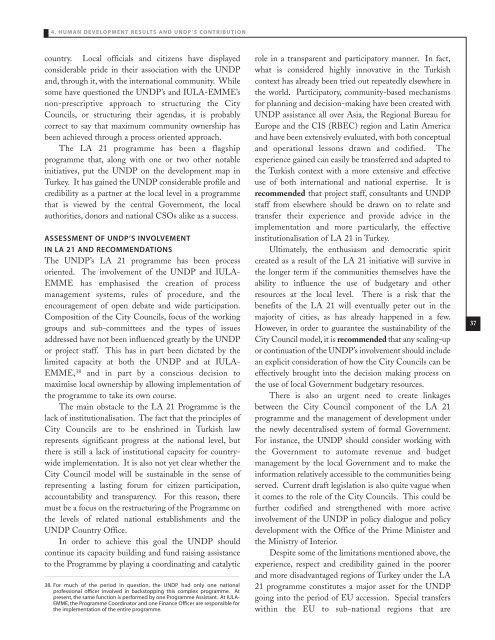Reports - United Nations Development Programme
Reports - United Nations Development Programme
Reports - United Nations Development Programme
You also want an ePaper? Increase the reach of your titles
YUMPU automatically turns print PDFs into web optimized ePapers that Google loves.
4. HUMAN DEVELOPMENT RESULTS AND UNDP’S CONTRIBUTION<br />
country. Local officials and citizens have displayed<br />
considerable pride in their association with the UNDP<br />
and, through it, with the international community. While<br />
some have questioned the UNDP’s and IULA-EMME’s<br />
non-prescriptive approach to structuring the City<br />
Councils, or structuring their agendas, it is probably<br />
correct to say that maximum community ownership has<br />
been achieved through a process oriented approach.<br />
The LA 21 programme has been a flagship<br />
programme that, along with one or two other notable<br />
initiatives, put the UNDP on the development map in<br />
Turkey. It has gained the UNDP considerable profile and<br />
credibility as a partner at the local level in a programme<br />
that is viewed by the central Government, the local<br />
authorities, donors and national CSOs alike as a success.<br />
ASSESSMENT OF UNDP’S INVOLVEMENT<br />
IN LA 21 AND RECOMMENDATIONS<br />
The UNDP’s LA 21 programme has been process<br />
oriented. The involvement of the UNDP and IULA-<br />
EMME has emphasised the creation of process<br />
management systems, rules of procedure, and the<br />
encouragement of open debate and wide participation.<br />
Composition of the City Councils, focus of the working<br />
groups and sub-committees and the types of issues<br />
addressed have not been influenced greatly by the UNDP<br />
or project staff. This has in part been dictated by the<br />
limited capacity at both the UNDP and at IULA-<br />
EMME, 38 and in part by a conscious decision to<br />
maximise local ownership by allowing implementation of<br />
the programme to take its own course.<br />
The main obstacle to the LA 21 <strong>Programme</strong> is the<br />
lack of institutionalisation. The fact that the principles of<br />
City Councils are to be enshrined in Turkish law<br />
represents significant progress at the national level, but<br />
there is still a lack of institutional capacity for countrywide<br />
implementation. It is also not yet clear whether the<br />
City Council model will be sustainable in the sense of<br />
representing a lasting forum for citizen participation,<br />
accountability and transparency. For this reason, there<br />
must be a focus on the restructuring of the <strong>Programme</strong> on<br />
the levels of related national establishments and the<br />
UNDP Country Office.<br />
In order to achieve this goal the UNDP should<br />
continue its capacity building and fund raising assistance<br />
to the <strong>Programme</strong> by playing a coordinating and catalytic<br />
————————————————————————————————————<br />
38. For much of the period in question, the UNDP had only one national<br />
professional officer involved in backstopping this complex programme. At<br />
present, the same function is performed by one <strong>Programme</strong> Assistant. At IULA-<br />
EMME, the <strong>Programme</strong> Coordinator and one Finance Officer are responsible for<br />
the implementation of the entire programme.<br />
role in a transparent and participatory manner. In fact,<br />
what is considered highly innovative in the Turkish<br />
context has already been tried out repeatedly elsewhere in<br />
the world. Participatory, community-based mechanisms<br />
for planning and decision-making have been created with<br />
UNDP assistance all over Asia, the Regional Bureau for<br />
Europe and the CIS (RBEC) region and Latin America<br />
and have been extensively evaluated, with both conceptual<br />
and operational lessons drawn and codified. The<br />
experience gained can easily be transferred and adapted to<br />
the Turkish context with a more extensive and effective<br />
use of both international and national expertise. It is<br />
recommended that project staff, consultants and UNDP<br />
staff from elsewhere should be drawn on to relate and<br />
transfer their experience and provide advice in the<br />
implementation and more particularly, the effective<br />
institutionalisation of LA 21 in Turkey.<br />
Ultimately, the enthusiasm and democratic spirit<br />
created as a result of the LA 21 initiative will survive in<br />
the longer term if the communities themselves have the<br />
ability to influence the use of budgetary and other<br />
resources at the local level. There is a risk that the<br />
benefits of the LA 21 will eventually peter out in the<br />
majority of cities, as has already happened in a few.<br />
However, in order to guarantee the sustainability of the<br />
City Council model, it is recommended that any scaling-up<br />
or continuation of the UNDP’s involvement should include<br />
an explicit consideration of how the City Councils can be<br />
effectively brought into the decision making process on<br />
the use of local Government budgetary resources.<br />
There is also an urgent need to create linkages<br />
between the City Council component of the LA 21<br />
programme and the management of development under<br />
the newly decentralised system of formal Government.<br />
For instance, the UNDP should consider working with<br />
the Government to automate revenue and budget<br />
management by the local Government and to make the<br />
information relatively accessible to the communities being<br />
served. Current draft legislation is also quite vague when<br />
it comes to the role of the City Councils. This could be<br />
further codified and strengthened with more active<br />
involvement of the UNDP in policy dialogue and policy<br />
development with the Office of the Prime Minister and<br />
the Ministry of Interior.<br />
Despite some of the limitations mentioned above, the<br />
experience, respect and credibility gained in the poorer<br />
and more disadvantaged regions of Turkey under the LA<br />
21 programme constitutes a major asset for the UNDP<br />
going into the period of EU accession. Special transfers<br />
within the EU to sub-national regions that are<br />
37

















